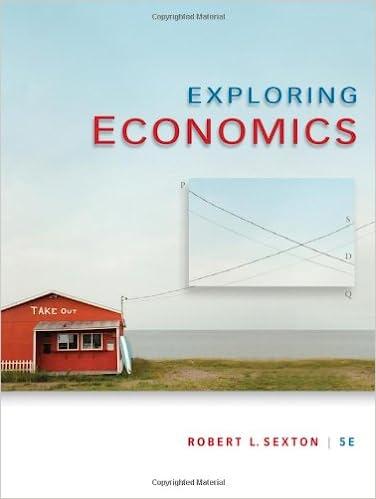Multiple Choice Questions: 1. If the rate of inflation in the United States falls relative to the
Question:
1. If the rate of inflation in the United States falls relative to the rate of inflation in foreign nations, U.S. net exports will tend to ___________, causing the exchange value of the U.S. dollar to ___________?
a. Rise; rise
b. Rise; fall
c. Fall; rise
d. Fall; fall
2. If real incomes in foreign nations were growing more rapidly than U.S. real incomes, one would expect that, as a result?
a. The exchange value of the dollar would decline relative to other currencies.
b. The exchange value of the dollar would increase relative to other currencies.
c. The exchange value of the dollar relative to other currencies would not change.
d. The effect on the exchange value of the dollar relative to other currencies would be undeterminable.
3. If real interest rates in the United States fell relative to real interest rates in other countries, other things being equal?
a. The exchange value of the dollar would decline relative to other currencies.
b. The exchange value of the dollar would increase relative to other currencies.
c. The exchange value of the dollar relative to other currencies would not change.
d. The effect on the exchange value of the dollar relative to other currencies would be undeterminable.
4. Sweden’s currency will tend to appreciate if?
a. The demand for Sweden’s exports increases.
b. The demand for imports by Swedes increases.
c. Real interest rates in Sweden decrease relative to those of the rest of the world.
d. Sweden’s inflation rate rises relative to inflation in the rest of the world.
5. A country will tend to experience currency depreciation relative to that of other countries if?
a. The profitability of investments in other countries increases relative to the profitability in that country.
b. People in the foreign currency markets expect the value of the currency to fall in the near future.
c. The foreign demand for its exports decreases.
d. Any of the above occur.
e. Any of the above except c occur.
6. If the dollar depreciates relative to the yen, we would expect?
a. That the Japanese trade surplus with the United States would increase.
b. That Japanese imports from the United States would decrease.
c. That Japanese exports to the United States would decrease.
d. That a and b would occur.
7. As the number of British pounds that exchange for a dollar falls on foreign currency markets?
a. The British will have an incentive to import fewer U.S. goods.
b. The British will find it easier to export goods to the United States.
c. The British will find U.S. goods to be more expensive in their stores.
d. All of the above will be true.
e. None of the above will be true.
8. If real interest rates in the United States rose and real interest rates in England fell, we would expect people to?
a. Increase their demand for British pounds.
b. Borrow more from U.S. sources.
c. Buy relatively more U.S. assets.
d. Buy relatively more British assets.
e. Do both b and c.
9. If the Federal Reserve were to sell U.S. dollars on the foreign exchange market, a likely result would be?
a. A rightward shift in the dollar supply curve.
b. At least a temporary decline in the exchange value of the U.S. dollar.
c. At least a temporary increase in the exchange value of the U.S. dollar.
d. a and b.
e. a and c.
Fantastic news! We've Found the answer you've been seeking!
Step by Step Answer:
Related Book For 

Question Posted:





